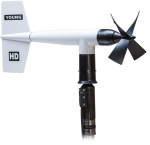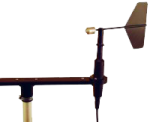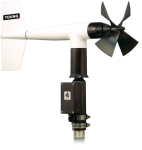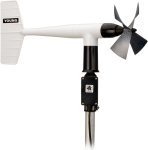
Good, all-purpose wind set






Overview
The 03002, manufactured by R. M. Young, measures wind speed and direction with a three-cup anemometer and a wind vane mounted on a small crossarm. It interfaces directly with your Campbell Scientific data loggers, so no signal conditioning is required.
Read MoreBenefits and Features
- Compatible with most Campbell Scientific data loggers
- Designed for continuous, long-term, unattended operation in adverse conditions
- Small size, simplicity, and rugged construction provide a quality instrument for a modest price
- Ideal for wind profile studies
- Compatible with the LLAC4 4-channel Low-Level AC-Conversion Module, which increases the number of anemometers one data logger can measure
- Campbell Scientific version uses shielded bearings, which lowers the anemometer's starting threshold
- Compatible with the CWS900-series interfaces, allowing it to be used in a wireless sensor network
Images





Detailed Description
The 03002 uses a cup wheel assembly to measure wind speed. Rotation of the cup wheel produces an ac sine wave that is directly proportional to wind speed. The frequency of the ac signal is measured by a data logger pulse count channel, then converted to engineering units (mph, m/s, knots). Campbell Scientific’s version uses shielded bearings, which lowers the anemometer’s threshold.
Wind direction is sensed by a potentiometer. With the precision excitation voltage from the data logger applied to the potentiometer element, the output signal is an analog voltage that is directly proportional to the azimuth angle of the wind direction.
Compatibility
Note: The following shows notable compatibility information. It is not a comprehensive list of all compatible or incompatible products.
Data Loggers
| Product | Compatible | Note |
|---|---|---|
| CR1000 (retired) | ||
| CR1000X (retired) | ||
| CR300 (retired) | ||
| CR3000 (retired) | ||
| CR310 | ||
| CR350 | ||
| CR6 | ||
| CR800 (retired) | ||
| CR850 (retired) |
Additional Compatibility Information
Mounting
The 03002 is supplied with a 12-in.-long x 1-in. IPS unthreaded aluminum pipe, which mounts to a crossarm via a CM220 Mount or 17953 Nu-Rail fitting. The 03002 can also be mounted to the top of a CM106B or stainless-steel tripod via the CM216.
Wind Profile Studies
An ideal application for the Wind Sentry is wind profile studies. For this application, the LLAC4 4-channel Low Level AC Conversion Module can be used to increase the number of anemometers measured by one data logger. The LLAC4 allows data logger control ports to read the anemometer’s ac signals instead of using pulse channels. Data loggers compatible with the LLAC4 are the CR200(X)-series (ac signal ≤1 kHz only), CR800, CR850, CR1000, CR3000, and CR5000.
Data Logger Considerations
Programming
The anemometer is measured by the PulseCount instruction in CRBasic, and by Instruction 3 (Pulse Count) in Edlog. The wind vane is measured by the BrHalf Instruction in CRBasic, and by Instruction 4 (Excite-Delay-SE) in Edlog. The measurements are typically processed for output with the Wind Vector Instruction (not present in the CR500 or CR9000).
Specifications
| Applications | General (Rain with light snow. Little or no riming or blowing sand. No salt spray.) |
| Sensor | 3-cup anemometer and vane |
| Measurement Description | Wind speed and direction |
| Operating Temperature Range | -50° to +50°C (assuming non-riming conditions) |
| Height | 32 cm (12.6 in.) |
| Crossarm Length | 40 cm (15.7 in.) between instruments (center-to-center) |
| Mounting Diameter | 34 mm (1.34 in.); mounts on standard 1-in. IPS pipe |
Wind Speed (Anemometer) |
|
| Range | 0 to 50 m/s (0 to 112 mph) |
| Gust Survival | 60 m/s (134 mph) |
| Sensor | 12-cm diameter cup wheel assembly, 40-mm diameter hemispherical cups |
| Accuracy | ±0.5 m/s (1.1 mph) |
| Turning Factor | 75 cm (2.5 ft ) |
| Distance Constant | 2.3 m (7.5 ft) 63% recovery |
| Starting Threshold | 0.5 m/s (1.1 mph) |
| Transducer | Stationary coil (1300 ohm nominal resistance) |
| Transducer Output | AC sine-wave signal induced by rotating magnet on cup wheel shaft 100 mV peak-to-peak at 60 rpm (6 V peak-to-peak at 3600 rpm) |
| Output Frequency | 1 cycle per cup wheel revolution (0.75 m/s per Hz) |
| Cup Wheel Diameter | 12 cm (4.7 in.) |
| Weight | 113 g (4 oz) |
Wind Direction (Vane) |
|
| Mechanical Range | 360° |
| Electrical Range | 352° (8° open) |
| Settling Time | 20 ms |
| Sensor | Balanced vane; 16 cm turning radius |
| Accuracy | ±5° |
| Damping Ratio | 0.2 |
| Delay Distance | 0.5 m (1.6 ft) 50% recovery |
| Starting Threshold |
|
| Transducer |
|
| Transducer Excitation | Requires regulated dc voltage. (15 Vdc maximum) |
| Transducer Output | Analog dc voltage proportional to wind direction angle with regulated excitation voltage supplied by the data logger |
| Vane Length | 22 cm (8.7 in.) |
| Weight | 170 g (6 oz) |
Documents
Frequently Asked Questions
Number of FAQs related to 03002-L: 9
Expand AllCollapse All
-
It is possible, but Campbell Scientific does not recommend user replacement. Factory replacement is strongly recommended.
-
A CM202, CM204, or CM206 crossarm can be used. Select the appropriate crossarm for the application. To mount the sensor to the crossarm, use a CM220 (Right-Angle Mounting Bracket) or a 17953 (1- x 1-inch NU-RAIL Crossover Fitting). To mount the sensor to the top of a CM110-series tripod, use a CM216 (Apex Sensor Mount for SS Tripod).
-
One cup cannot be replaced at a time. The whole cup assembly would need to be replaced. The cup assembly can be replaced by the user.
-
The 034B-L uses a switch closure for wind speed measurement, and the 03002-L uses a low-level ac output for wind speed measurement. Both use a pulse channel on the data logger to measure wind speed.
-
Most Campbell Scientific sensors are available as an –L, which indicates a user-specified cable length. If a sensor is listed as an –LX model (where “X” is some other character), that sensor’s cable has a user-specified length, but it terminates with a specific connector for a unique system:
- An –LC model has a user-specified cable length for connection to an ET107, CS110, or retired Metdata1.
- An –LQ model has a user-specified cable length for connection to a RAWS-P weather station.
If a sensor does not have an –L or other –LX designation after the main model number, the sensor has a set cable length. The cable length is listed at the end of the Description field in the product’s Ordering information. For example, the 034B-ET model has a description of “Met One Wind Set for ET Station, 67 inch Cable.” Products with a set cable length terminate, as a default, with pigtails.
If a cable terminates with a special connector for a unique system, the end of the model number designates which system. For example, the 034B-ET model designates the sensor as a 034B for an ET107 system.
- –ET models terminate with the connector for an ET107 weather station.
- –ETM models terminate with the connector for an ET107 weather station, but they also include a special system mounting, which is often convenient when purchasing a replacement part.
- –QD models terminate with the connector for a RAWS-F Quick Deployment Station.
- –PW models terminate with the connector for a PWENC or pre-wired system.
-
Not every sensor has different cable termination options. The options available for a particular sensor can be checked by looking in two places in the Ordering information area of the sensor product page:
- Model number
- Cable Termination Options list
If a sensor is offered in an –ET, –ETM, –LC, –LQ, or –QD version, that option’s availability is reflected in the sensor model number. For example, the 034B is offered as the 034B-ET, 034B-ETM, 034B-LC, 034B-LQ, and 034B-QD.
All of the other cable termination options, if available, are listed on the Ordering information area of the sensor product page under “Cable Termination Options.” For example, the 034B-L Wind Set is offered with the –CWS, –PT, and –PW options, as shown in the Ordering information area of the 034B-L product page.
Note: As newer products are added to our inventory, typically, we will list multiple cable termination options under a single sensor model rather than creating multiple model numbers. For example, the HC2S3-L has a –C cable termination option for connecting it to a CS110 instead of offering an HC2S3-LC model.
-
- Using Short Cut, click the applicable wind direction sensor in the Selected Sensors list of the Outputs screen.
- The two output options enabled are Sample and WindVector. Select WindVector.
- The WindVector instruction has output options. Select an option with mean wind direction in it.
-
Many Campbell Scientific sensors are available with different cable termination options. These options include the following:
- The –PT (–PT w/Tinned Wires) option is the default option and does not display on the product line as the other options do. The cable terminates in pigtails that connect directly to a data logger.
- In the –C (–C w/ET/CS110 Connector) option, the cable terminates in a connector that attaches to a CS110 Electric Field Meter or an ET-series weather station.
- In the –CWS (–CWS w/CWS900 Connector) option, the cable terminates in a connector that attaches to a CWS900-series interface. Connection to a CWS900-series interface allows the sensor to be used in a wireless sensor network.
- In the –PW (–PW w/Pre-Wire Connector) option, the cable terminates in a connector that attaches to a prewired enclosure.
- In the –RQ (–RQ w/RAWS Connector) option, the cable terminates in a connector that attaches to a RAWS-P Permanent Remote Automated Weather Station.
Note: The availability of cable termination options varies by sensor. For example, sensors may have none, two, or several options to choose from. If a desired option is not listed for a specific sensor, contact Campbell Scientific for assistance.
-
To incorporate a sensor that is compatible with wireless sensor interfaces into a wireless network, a CWS900-series wireless sensor interface is needed, as well as an A205 CWS-to-PC interface to configure it.
Case Studies
International partnerships for sustainable innovations Improved water use in agriculture is essential to successfully adapt to......read more
The Department of Science and Innovation (DSI) and its partners, including the Department of Basic......read more
Privacy Policy Update
We've updated our privacy policy. Learn More
Cookie Consent
Update your cookie preferences. Update Cookie Preferences







